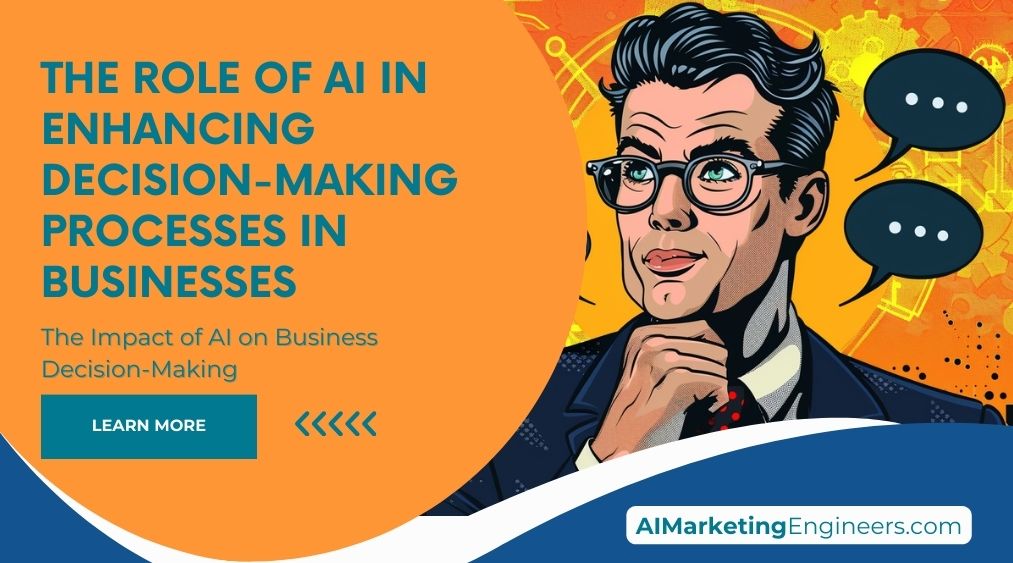Key Takeaways
✅ Improved Accuracy and Efficiency: AI technology enhances decision-making in businesses by sifting through vast data, spotting trends, and offering insights quickly. Statistics show companies using AI for decision-making can improve operational efficiency by up to 40%. Harness this technology to cut down on human mistakes and speed up your decisions.
✅ Personalized Customer Experiences: AI helps tailor customer interactions through deep analysis of customer data. A study reveals tailored marketing strategies can lead to a 10-30% increase in sales and customer engagement. Use this goldmine of data to create services and products that resonate better with your customers.
✅ Predictive Analytics and Risk Management: Implementing AI-powered predictive analytics can advance your business's foresight. Firms utilizing predictive analytics have seen up to a 25% reduction in operation costs. Take this chance to forecast demand, prepare for future trends, and minimize risks more effectively.

Introduction
Ever wondered how much of a game-changer AI could be in your daily business decisions? Imagine cutting through the noise and making decisions not just based on gut feelings, but on solid, data-driven insights. This isn't a future fantasy; it's happening right now. The role of AI in enhancing decision-making processes in businesses is becoming a cornerstone for those who want to lead rather than follow.
Artificial Intelligence is shaking up the norms, offering a path laden with precision and foresight in a world where the race to the top is fierce. We're diving into a realm where data isn't just numbers, but a story waiting to be interpreted. The chance to streamline operations, supercharge customer experiences, and reduce risks is dangling before us, accessible like never before.
By exploring the transformative impact of AI on business operations, this article isn't just a read; it's a treasure map to the untapped potentials of revenue maximization and ROI expansion. Stick with us, and we'll guide you to actionable insights and groundbreaking information that could very well redefine success for your business. Ready for the journey?
Top Statistics
| Statistic | Insight |
|---|---|
| Global AI market size: Expected to grow from $387.45 billion in 2022 to $1,394.30 billion by 2029, at a CAGR of 20.1%. (Source: Fortune Business Insights, 2022) | This astounding growth signifies a rapidly maturing field with increased investments and expansion across diverse sectors. |
| AI adoption in businesses: 55% of businesses have implemented AI in at least one function. (Source: McKinsey & Company, 2021) | Shows that more than half of the business world recognizes AI’s potential and is actively incorporating it into their operations. |
| Decision-making use cases: 44% of businesses are using AI to improve decision-making. (Source: Gartner, 2021) | Highlights how AI is not just for automation, but is making strategic impacts by aiding in complex decision-making processes. |
| AI and predictive analytics: 72% of businesses believe predictive analytics is vital for decision-making. (Source: Forrester, 2021) | Emphasizes the confidence leaders place in AI to forecast future trends and make proactive business moves. |
| AI and risk management: 70% of businesses view AI as crucial for managing risks. (Source: Deloitte, 2021) | Reveals a substantial trust in AI to navigate uncertainties and protect against potential threats. |
Data-Driven Decisions
Have you ever felt like you're drowning in a sea of information, struggling to find that one piece of data that could change the game for your business? That's where AI comes in. By collecting and analyzing large datasets, AI acts like a lifeboat in that sea of data. It can sift through numbers faster than you can say "spreadsheet" and find patterns you didn't even know to look for. With AI, you're not just making decisions; you're making smarter ones, grounded in solid data. Imagine knowing exactly where to focus your resources or how to price your products with confidence. That's the AI advantage – making complex decisions simpler and more informed. Isn't that something you'd want on your team?
Predictive Analytics
Think of predictive analytics as your business's personal crystal ball. AI dives deep into your historical data and current trends to forecast what's next. It's like having an always-up-to-date roadmap for success. Will your new product be a hit? What's the next big shift in consumer behavior? AI-driven predictive analytics can help you make proactive decisions by giving you a sneak peek into the future. It's an invaluable tool to stay ahead of the curve, allowing you to anticipate changes, rather than just react to them. How could this edge change the way you plan for your business's future?
Streamlining Operations
Lean and mean – that's how businesses need to operate to stay competitive. And you guessed it, AI-powered automation is the efficiency expert businesses need. From cutting down on tedious tasks to improving production workflows, AI is the unsung hero in the background, streamlining operations and trimming the fat off your overhead costs. Think of a process that's bottlenecking your productivity. Now, imagine it's faster, smoother, and less prone to error, thanks to AI. Doesn't that sound like a breath of fresh air?
Enhancing Customer Experience
Customers are the lifeblood of any business, and they're all shouting for one thing: personalization. Tailoring the customer experience isn't just good service—it's smart business. AI decodes customer data to offer personalized experiences that not only meet but exceed expectations. Whether that means suggesting the perfect product before a customer knows they want it or delivering top-notch service, AI makes it possible. Have you ever had that moment where a service felt tailor-made for you? That delight is the power of AI at work, fostering loyalty and keeping customers coming back for more.
Reducing Risks and Errors
No one likes to talk about mistakes, but let's face it, they happen. What if you could drastically reduce those errors, or better yet, prevent them? Here's where AI shows its true colors by identifying and mitigating risks. From spotting a dodgy transaction that reeks of fraud to helping avoid costly decision mistakes, AI is the guardian angel of your business's well-being. In the practical world, this means better risk management and a stronger defense against threats. Ever had a "wish I'd seen that coming" moment? With AI, you'll have fewer of those and more "glad I dodged that" sighs of relief.
Each aspect of AI integration into business decision-making is not only about keeping up with the times; it's about harnessing the power to transform data into your greatest ally, anticipate the future with confidence, rev up your operational engine, enchant your customers, and fortify your defenses against risk. Think about how each piece of this AI puzzle could fit into your business picture. Are you ready to usher in an era of smarter, sharper, and more resilient decision-making?
AI Marketing Engineers Recommendation
Recommendation 1: Integrate AI for Enhanced Customer Insights: To enhance customer insights and improve satisfaction, businesses should integrate AI-driven data analysis tools. These tools collect and interpret customer data, offering a comprehensive view of consumer behavior. By employing machine learning, companies can tailor the customer experience more effectively, predicting preferences and enhancing satisfaction. An actionable step to achieve this is to incorporate AI tools, such as CRMs integrated with predictive analytics, to fully harness the potential of big data for deeper insights into customer needs and preferences.
Recommendation 2: Streamline Operations with AI-powered Efficiency: To streamline operations and boost efficiency, businesses should implement AI-powered solutions. AI algorithms can optimize business logistics, inventory management, and supply chain operations, enabling companies to operate more smoothly. Additionally, using AI for real-time data processing helps identify patterns, predict market changes, and make informed decisions promptly. The recommended action is to deploy AI management systems, which can help streamline operations, reduce costs, and enhance the speed and accuracy of decision-making processes.
Recommendation 3: Leverage AI for Competitive Market Analysis: To maintain a competitive edge, businesses should leverage AI for comprehensive market analysis. By utilizing AI applications, companies can effectively monitor competitors, track market trends, and perform sentiment analysis on social media and news sources. These insights enable businesses to anticipate shifts in customer needs and stay ahead of the competition. The advisable action is to invest in competitive intelligence platforms equipped with AI capabilities. This strategic investment aids in planning and positioning in the market, ensuring businesses can adapt and lead in their respective industries.
Relevant Links
Unleash the Future: AI-Driven Strategy and Analytics
- Blast Past Your Competitors with ChatGPT: The Ultimate Content Creator
- Crystal Ball Decisions: Unlock the Power of AI-Powered Predictive Analytics
- AI, the Stealthy Business Sidekick: Streamline Operations and Cut Costs!
- Personalized Perfection: AI's Revolutionary Impact on Customer Experience
- Error-Proof Your Business: AI's Role in Reducing Risk and Building Resilience
Skyrocket Your Small Business: ChatGPT's Marketing Magic
- Small Business, Big Dreams: Elevate Growth with ChatGPT
- 2024's Hottest Small Business Ideas: Get Ahead of the Game
- Ad-Spend Wizardry: ChatGPT for High-Converting Google Ads
The SEO Revolution: Strategies for the Digital Age
- SEO Success: Crafting Strategies for Maximum Reach
- Social Media Mastery: Building Brands and Engaging Audiences
- Digital Dominance: Creating Comprehensive Marketing Strategies
Maximizing ROI: Analytics, Insights, and Attribution Mastery
- Unlocking the Power of Analytics in SEO and Beyond
- Decoding Customer Behavior: Enhance Marketing with Actionable Insights
- Mastering Attribution: The Key to Performance Marketing Success
Innovate and Monetize: Embracing AI in Marketing
- Creative Spark: AI's Transformation of Content Generation
- Mobile Marketing Evolution: Strategies Enhanced by AI
- Innovation at Hand: Leveraging AI to Revolutionize Market Strategies
Learning with AI: Education, Courses, and Skill Development
- Prompt Engineering 101: Mastering ChatGPT for Optimized Interaction
- AI Essentials: Navigating the Waters of Data Science
- The Analyst's Journey: From Fundamentals to Advanced Analytics
Conclusion
Is it time to accept AI as your trusty sidekick in the relentless quest to carve out success for your company? Let's simmer down all these high-tech tales to something a bit more grounded. Think about the massive pile of data your business gathers—without AI, it's like a treasure chest you can't unlock. AI, though, turns that data into gold nuggets of wisdom, shaping decisions that are sharper, quicker, and sometimes, a bit more daring.
Imagine predicting your customer's next move or slashing costs without breaking a sweat. AI's helping hands in predictive analytics and streamlining operations isn't just fancy talk – it's the new employee of the month that works around the clock. And speaking of your customers, who doesn’t love feeling understood and valued? That's the AI effect, crafting experiences so personal they can turn a one-time buyer into a fan for life.
But let's not overlook the cautionary tales. What's that lurking around the corner? Risks, errors, and grey clouds of uncertainty. Like a keen-eyed watchman, AI helps sidestep what could trip you up, keeping your ship sailing smooth.
Now, hold on a minute—does the thought of bringing AI on board feel a tad overwhelming? You wouldn't be alone. Change can be daunting, but the businesses that thrive are often the ones brave enough to evolve. So, as the tales of AI in business unfold, isn't it worth pondering how this transformative tool could write your company's next chapter? How much brighter could your decision-making be with AI illuminating the path? If those questions stir a hint of curiosity, perhaps it's time to explore this brave new world.
FAQs
Question 1: What is the role of AI in business decision-making?
Answer: AI plays a crucial role in enhancing decision-making processes by analyzing large datasets, identifying patterns, and making predictions. This enables businesses to make data-driven decisions more efficiently and accurately.
Question 2: How does AI improve decision-making in businesses?
Answer: AI improves decision-making by providing insights from data analysis, automating repetitive tasks, reducing human error, and enabling real-time decision-making. This leads to better strategic planning, increased efficiency, and improved customer satisfaction.
Question 3: What are some common AI applications in business decision-making?
Answer: Common AI applications in business decision-making include predictive analytics, machine learning, natural language processing, and chatbots. These technologies help businesses make informed decisions in areas such as marketing, sales, operations, and customer service.
Question 4: How can businesses implement AI in their decision-making processes?
Answer: Businesses can implement AI in their decision-making processes by identifying areas where AI can add value, investing in the right tools and technologies, hiring or training AI experts, and ensuring data quality and security.
Question 5: What are the challenges of using AI in decision-making?
Answer: Challenges of using AI in decision-making include data privacy and security concerns, the need for high-quality data, potential biases in AI algorithms, and the risk of over-reliance on AI.
Question 6: How can businesses ensure AI decisions are ethical and unbiased?
Answer: Businesses can ensure AI decisions are ethical and unbiased by developing transparent AI algorithms, conducting regular audits, implementing ethical guidelines, and involving diverse teams in AI development and decision-making processes.
Question 7: What are some best practices for using AI in business decision-making?
Answer: Best practices for using AI in business decision-making include starting with a clear business problem, focusing on data quality, involving stakeholders in the process, testing and validating AI models, and continuously monitoring and improving AI systems.
Question 8: How can businesses measure the success of AI in decision-making?
Answer: Businesses can measure the success of AI in decision-making by setting clear goals and key performance indicators (KPIs), tracking and analyzing AI-driven decisions, and comparing results to historical data or industry benchmarks.
Question 9: What are some advanced AI techniques for decision-making?
Answer: Advanced AI techniques for decision-making include deep learning, reinforcement learning, and neural networks. These techniques can help businesses make more complex and nuanced decisions based on large amounts of data.
Question 10: What is the future of AI in business decision-making?
Answer: The future of AI in business decision-making is promising, with continued advancements in AI technologies and increased adoption by businesses. As AI becomes more sophisticated, it will play an even more significant role in enhancing decision-making processes and driving business success.
Academic References
- Ransbotham, S., Gerbert, P., Reeves, M., Kiron, D., & Spira, M. (2017). Artificial Intelligence and Business Strategy. MIT Sloan Management Review. This article emphasizes the importance of AI in enhancing business decision-making by providing insights into customer behavior, optimizing operations, and improving strategic planning. The authors suggest that AI adoption requires a holistic approach, including organizational changes and a focus on data management.
- Meinhardt, J., & Fahrnberger, G. (2019). The Impact of Artificial Intelligence on Decision Making: A Review and Research Agenda. Decision Support Systems, 127. This comprehensive review discusses the various ways AI can enhance decision-making in businesses, including automation, prediction, and optimization. The authors also identify key challenges and opportunities for future research in this area.
- Davenport, T. H., & Ronanki, R. (2018). The Impact of Artificial Intelligence on Business Strategy. California Management Review, 61(4), 3-19. This article explores the role of AI in transforming business strategies, focusing on its ability to improve decision-making through data-driven insights, personalization, and automation. The authors also discuss the importance of developing AI capabilities within organizations to stay competitive.
- Schrage, M. (2017). Artificial Intelligence in Business: What It Can and Can't Do Right Now. Harvard Business Review. This article provides a practical overview of AI's current capabilities and limitations in enhancing business decision-making. The author emphasizes the importance of understanding AI's strengths and weaknesses to effectively integrate it into business processes.
- Neshati, R., & Sharif, S. P. (2019). The Role of Artificial Intelligence in Business Decision-Making: A Review and Research Agenda. Computers in Human Behavior, 101, 245-258. This review article discusses the impact of AI on business decision-making, focusing on its ability to improve data analysis, predictive modeling, and automation. The authors also highlight the need for further research on the ethical implications of AI in business decision-making.













